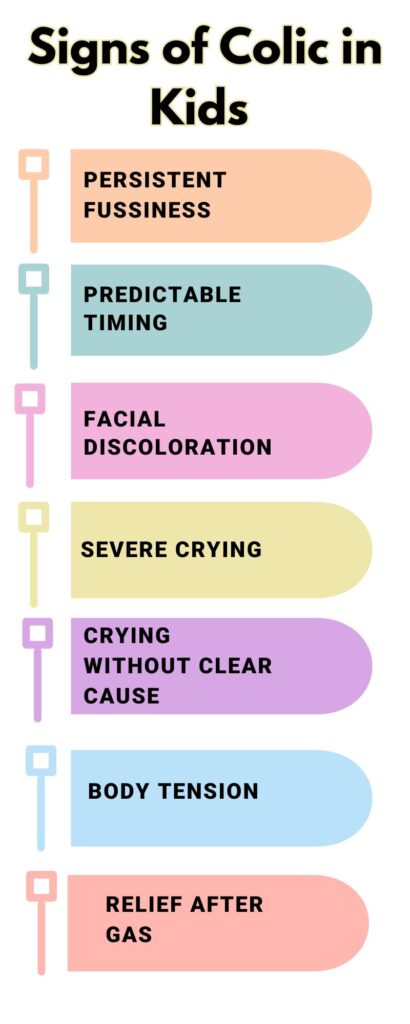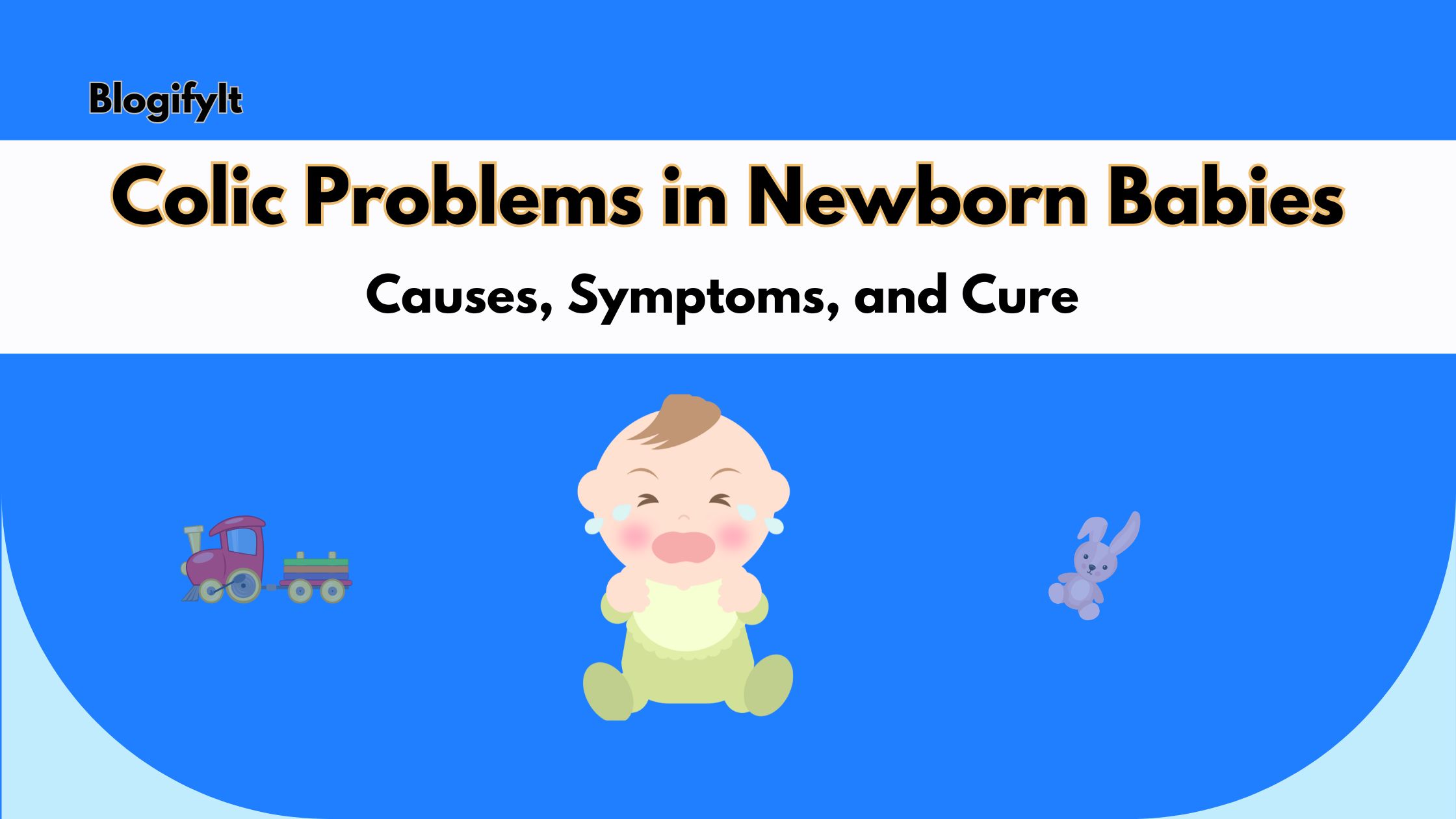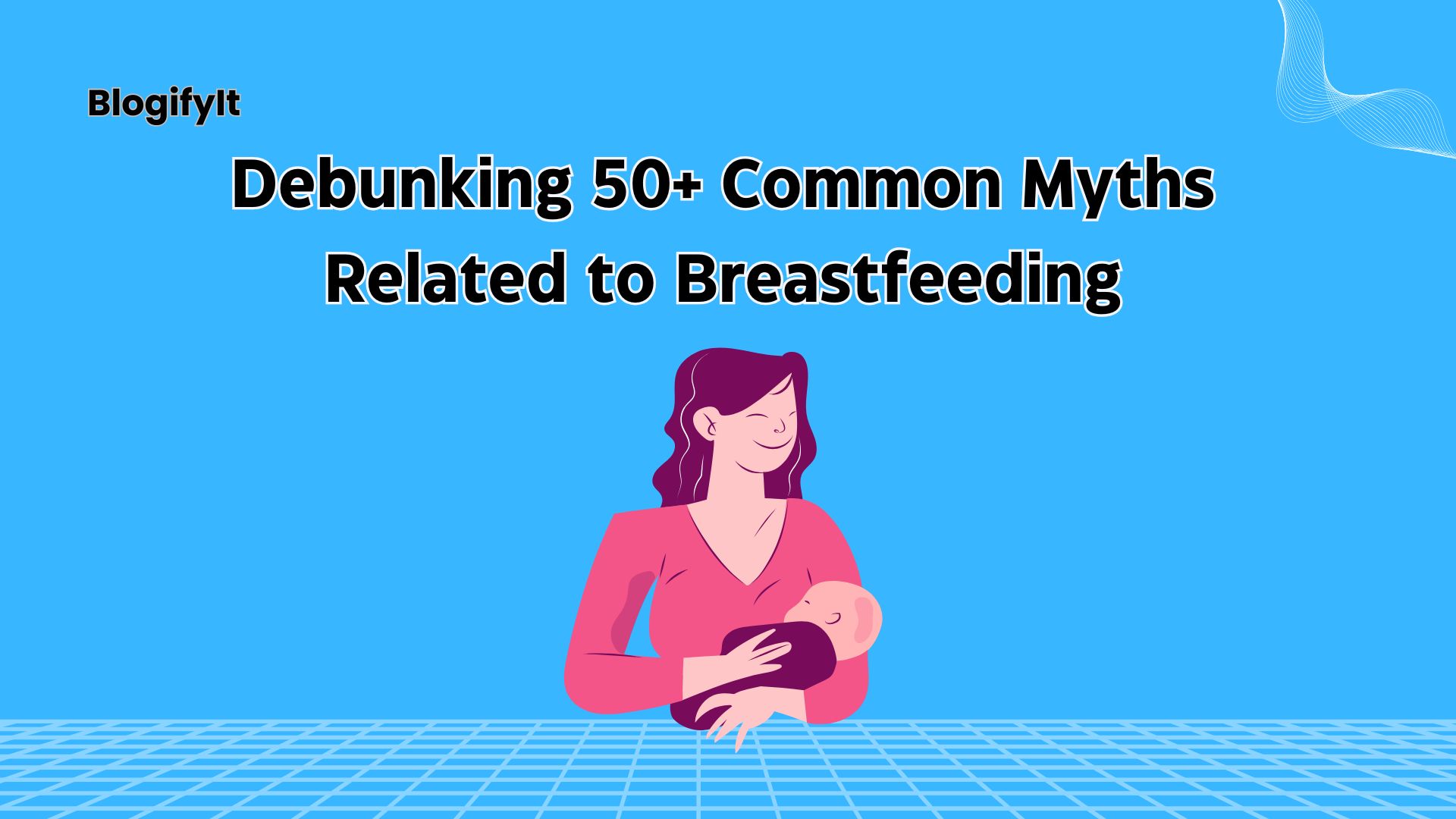Colic Problems in Newborn Babies: Causes, Symptoms, and Cure
Summary: This blog will talk about colic problems in newborn babies. It will include causes, symptoms, and cure. We will also learn when you should call your doctor so that you can ensure your baby’s well-being.
Have you ever found yourself awake at odd hours, listening to your newborn’s cries and feeling utterly helpless? You’re not alone. Colic problems in newborn babies is a common concern for many new parents, turning those early weeks into a rollercoaster of emotions. The good news is that you’re in the right place to learn more about this challenging phase.
While it can be incredibly distressing for both baby and parents, understanding colic can make a significant difference. In this journey, we’ll explore what colic really is, its potential causes, and effective strategies for soothing your little one. So, without any further ado, let’s get started!
What is Colic: Definition

Colic is severe, fluctuating abdominal pain caused by spasms of the intestine or other parts of the digestive tract. It may affect infants as well as adults and presents with episodes of severe discomfort. As per a report, colic affects 10 to 40% of infants globally.
In infants, colic is usually described as crying and fussiness with no obvious cause. It generally occurs in most babies within the first few months of life. In adults, colic can be associated with gallstones or bowel obstruction and will depend on the cause of the treatment.
What Causes Colic Problems in Newborn Babies: Top Reasons
Colic in newborn babies can be attributed to a number of factors. They include:
1. Digestion Issues
Newborns have immature digestive systems, which are still developing. This makes it difficult for the system to break down food properly. It leads to gas, bloating, and abdominal pain. The change from a liquid diet in utero to feeding is very challenging, and digestive discomfort is common.
2. Food Sensitivities
Infants are likely to be sensitive to specific proteins in breast milk or formula, which are usually the proteins found in cow’s milk. This usually results in allergic reactions or intolerances leading to gastrointestinal upsets, such as gas, diarrhea, or rashes, and sometimes helps relieve colicky behavior.
3. Adjustment to the World
A nine-month-old fetus may find it difficult to adjust to the outside world. The light, sounds, and everything else will cause the baby to become irritable and cry for a considerable period.
4. An Immature Nervous System
The newborn’s nervous system is not yet fully developed and can be more responsive to stimuli. This means they are overly sensitive to pain and discomfort, thus having episodes of colic when babies fail to process what they are going through.
5. Emotional Response
Babies are sensitive to the feelings of their caregivers. When parents are extremely stressed or anxious, the baby tends to pick up on it and may even become frantic as well. A serene environment can calm down the baby as well as the mother.
6. Overstimulation
Too much sensory input, loud noises, bright lights, or too many people handling the baby- overwhelms a newborn. This overstimulation brings irritability and crying since the baby needs to withdraw from the overwhelming environment.
7. Hunger or Feeding Issues
Some babies will have an issue with feeding. For example, they might not be able to latch properly, or they might eat very slowly. This often leaves them with not enough to eat. Such babies hunger even when they have been fed recently. Sometimes, it is helped by frequent feeds or cluster feeding.
8. Reflux
Newborns need a lot of care and especially at the time when they are suffering from any health problem and Gastroesophageal reflux (GER) is one of them. The stomach contents flow into the esophagus with discomfort and pain. Reflux can cause crying during or after feeding. Babies may not be able to find relief from a burning sensation.
9. Parental Stress
The emotional state of a parent may also impact a baby’s behavior. It creates a cycle when babies become more irritable on seeing their parents’ distress and anxiety. This adds to the parents’ anxiety and stress, thus intensifying the cycle. Some support and self-care strategies can break this cycle.
10. Sleep Problems
Sleep in newborns is quite crucial. However, most newborns have disrupted sleep patterns, and lack of sleep can contribute to irritability. Babies will have trouble settling down or become overtired, cry more, and be harder to soothe.
10. Teething
Most teething occurs relatively late in infancy, though some get uncomfortable with this at merely a few months of life. Pressure and pain that the emerging teeth are generating can lead sometimes to overdiagnosis as a colic.
11. Parental Feeding Practices
The way a baby is fed may contribute to his problem. Bottle feeding with a fast-flow nipple causes the baby to ingest air, which he expels and feels discomfort. In such cases, parents need to feed their babies right so that colic symptoms are not exaggerated.
12. Growth Spurts
Every time the baby experiences spurs in growth, the baby becomes cranky and demands frequent feeds. The sudden hunger leads to the child feeling pain if left unattended.
These would therefore give parents and guardians a basis for better supporting their babies. If, on the other hand, there are worsening or persistence symptoms, then it’s appropriate to seek professional attention.
What Are its Signs: Top Symptoms

Colic problems in newborn babies generally start with crying. This happens within the first three months of life, it’s really impossible to tell exactly what is normal, and what is not. Basically, it can last three or more hours a day, three days or more weeks, for over three weeks. So, how to know its colic? Here are some possible signs of colic:
- Persistent Fussiness: They may continue to be fussy even after the crying has subsided.
- Predictable Timing: Episodes usually recur at the same time each day, typically in the evening.
- Facial Discoloration: There may be noticeable changes in skin color, such as flushing or blushing.
- Severe Crying: The crying almost becomes screaming and can be perceived as the expression of pain.
- Crying Without Clear Cause: They seem to cry for no apparent reason, as opposed to cries to be hungry or wet.
- Body Tension: The infant may display tension by pulling the legs toward the body, stiff arms, clenched fists, arching the back, or a tense abdomen.
- Relief After Gas: These symptoms can sometimes cease upon passing gas or having a bowel movement, especially resulting from swallowed air when babies cry for long periods.
Knowing these signs helps parents recognize colic. Hence, provide the right support for their infants.
Is There Any Medication for Colic Problems in Newborn Babies?
Managing colic can be challenging for parents and caregivers. Here are some medications and remedies that may help relieve colic in newborns:
- Simethicone Drops: This anti-foaming agent helps relieve gas and abdominal discomfort by merging smaller gas bubbles into larger ones, making them easier to pass. You can add it to a bottle or give it directly to the baby.
- Lactase Drops: This enzyme helps infants with colic by breaking down milk sugar into glucose and galactose, which may ease digestive issues.
- Colicaid: This brand offers a range of infant colic solutions, including syrup and oral drops to relieve symptoms.
- Gastica Drops: Another option available is Gastrica Drops, which may assist in managing colic in infants.
Always consult a healthcare professional before administering any treatment to ensure it is safe and suitable for your baby.
How to Soothe a Colic Baby: Simple Ways
Colic treatment aims to provide maximum relief to the baby as much as possible, along with consolation for parents to counter stress, mostly linked to colic. Here are some home remedies for colic in babies:
1. Soothing Strategies
In soothing techniques, you can work out a plan that helps. It is likely a little experimentation on your own to figure out what exactly works best for your little one because, at times, more methods will work better for your baby than others do. You may try one of the following soothing methods.
- Pacifiers: Most children who are sucking seem to relax.
- Car Rides or Stroller Walks: There is a possibility that moving can be a great remedy against crying.
- Rocking or Walking: It will indeed be soothing when you cradle and rock your baby delicately.
- Swaddling: Wrapping the baby tight in a blanket can help create a feeling of security.
- Warm Bath: Warm bath helps in unwinding your baby.
- Tummy Rubs: A gentle rubbing of the baby’s tummy or even placing him on his tummy for some gentle back rubbing may relieve discomfort.
- Soft Sounds: Playing recordings of heartbeats or soft, soothing sounds can help.
- White Noise: You can use a white noise machine or run the vacuum cleaner or clothes dryer near to create some noises to quieten your baby into the womb.
- Dimming Lights: Reducing visual stimulation might help calm the baby more than dimming the light. It would make him feel like he is in a peaceful environment.
2. Feeding Practices
Some patients look for help by changing their feeding techniques. Bottle-feeding includes holding the baby in a correct posture and burping throughout the feeding and after every time a baby feeds. An infant can be positioned upright to feed with easier suction of air by making a straight bottle into a curved bottle. An un-collapsible bag bottle prevents the baby from inhaling much air.
3. Dietary Changes
If soothing and feeding measures are not helping to relieve your baby’s crying, your doctor may suggest a short-term trial of dietary changes. Food allergies typically do not present without other symptoms such as rashes, wheezing, vomiting, or diarrhea. Some of the possible dietary changes include:
- Formula Changes: If you formula-feed your baby, your pediatrician may also recommend a trial of an extensively hydrolyzed formula, such as Similac Alimentum, Nutramigen, or Pregestimil. This type of formula uses proteins broken down into smaller, more easily digested units.
- Motherly Diet: This diet involves avoiding the known allergen foods for breast-feeding mothers. Removing foods in the diet of a woman that might contain irritations or allergens which include cabbages, onions and caffeinated beverages.
4. Caring of the Parent
The feeling of an infant diagnosed with colic is straining and exhaustive even for experienced parents. Here are some tips that may help you set priorities of yours and seek to get you well and the one you can rely on now:
- Take Breaks: Share with your partner or a friend. It makes it possible for you to get away at times while caring for them.
- Make Use of the Crib: It’s perfectly all right to leave your baby in his crib for a bit during a spate of crying so that you can gather yourself up.
- Speak About Your Feelings: You’ll feel helpless, guilty, or frustrated. Don’t be afraid to talk about your feelings with trusting family members, friends, or your child’s doctor.
- Don’t Be Self-Judgmental: The colic has nothing to do with your parenting. The crying baby doesn’t imply that you are a failed parent.
- Pay Attention to Health: Healthy diet and regular exercise, such as a brisk walk. Make an effort to rest as much as your baby is sleeping. Avoid alcohol or other substances that can hurt your well-being.
- Recognize It’s Temporary: Colic episodes often get dramatically better after 3-4 months of age.
- A Plan for Backup Support: Discuss a plan with friends or relatives to support you in times of stress. It is not a problem to get help from a healthcare provider, a local crisis intervention service, or a mental health hotline if you need more.
You can prepare a more supportive atmosphere for yourself and your baby by utilizing these strategies.
When to Call a Doctor? Is There Any Risk Factor
If your baby has colic, it’s important to consult a doctor if you notice any of the following symptoms:
- Fever: A temperature of 100.4°F (38°C) or higher.
- Forceful Vomiting: Vomiting that is particularly strong.
- Weight Gain Issues: Not gaining weight as anticipated.
- Loose Stools: Frequent diarrhea.
- Blood in Stools: Any signs of blood in the stool.
- Breathing Difficulties: Increased effort or noticeable changes in breathing.
- Excessive Sleepiness: More sluggish than usual.
- Irritability: More fussy when being held or touched.
- Sudden Changes in Crying: Becoming inconsolable or changes in crying patterns.
- Feeding Difficulties: Trouble sucking or drinking from a bottle.
Colic is typically defined by crying that lasts at least three hours a day, for three or more days each week, over the course of three weeks or longer. Although colic can be distressing for both parents and infants, it is generally not harmful, and most babies will outgrow it.
What Not to Do in Colic: Things to Avoid in Colic
There are a lot of responsibilities that come with having to care for an infant, and there are various practices that one must put in place to ensure the baby’s safety and well-being. Some very essential practices are as follows.
1. Do Not Shake Your Baby
Shaking an infant will cause extreme damage as the brain might get dislocated, the infant loses his eyesight, and in extreme cases, one might lose his life; therefore, they must always be handled with care.
2. Safe Sleep Position
This reduces the risks associated with SIDS syndrome and ensures airways are clear while the baby sleeps. Do not place him or her on his or her stomach and side, as their place may lead to the possible occurrence of SIDS, whereby the baby may likely stop breathing.
3. Proper Feeding
Feeding your baby requires constant observation to feed them the right amount of nutrition. Overfeeding causes discomfort and sometimes even digestive issues, whereas underfeeding slows down their growth and development. Keep track of your baby’s hunger signals and seek guidance from your healthcare provider about how much to feed your baby.
4. Burping After Feedings
Burp your baby after every feed, as it might help the air from the stomach come out. That would decrease the pain they would feel, and also, there would be fewer chances of vomiting. Try out different techniques to burp, as each baby is different.
5. Diet of Breastfeeding Mothers
The diet of breastfeeding mothers is also a matter of importance. There are a few food items that will cause colic in babies or make them uncomfortable. Generally, those foods include:
- Caffeine
- Chocolate
- Milk and other dairy products
- Nuts
- Gassy or spicy foods
- Maintain a food diary to track if the baby is affected. You can share this record with your healthcare provider.
6. Bottle-Feeding Tips
If your baby has gastrointestinal issues while being bottle-fed, talk to your healthcare provider. He or she may want to try a one-week course of a non-milk-based formula to determine if symptoms improve.
By following these guidelines, you can ensure that your baby is healthy and happy. Do not hesitate to consult a healthcare provider if you are concerned or need further guidance on caring for your baby.
Parting Thoughts
So, today we learned that colic problems in newborn babies is quite normal and there is nothing to worry about. However, you need to be patient when handling your child during this time. Always make sure that you watch out for alarming signs as mentioned in the blog and don’t make mistakes that can worsen the situation. If you have any questions, please let us know in the comment section below.




